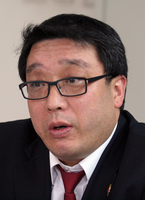Nationwide system to help combat bribery
 0 Comment(s)
0 Comment(s) Print
Print E-mail
China Daily, October 14, 2011
E-mail
China Daily, October 14, 2011
 |
|
Song Hansong, director of the department of duty crime prevention of SPP. |
A national system to keep track of bribery convictions will be set up by the end of this year, said a senior official of the Supreme People's Procuratorate.
Individuals or companies found to have offered bribes are likely to be disqualified from bidding for other projects, said Song Hansong, director of the department of duty crime prevention of the procuratorate, in an exclusive interview with China Daily.
Cases of bribery have become increasingly rampant in recent years. In 2010, there were 3,194 suspects prosecuted of providing bribes, a 30-percent increase from the year before, Song said.
"These bribers, often targeting government officials, offer money to gain illegal returns. They have seriously disordered the market economy," he said.
According to Song, bribery tends to occur in capital-intensive industries such as construction, finance, education, health and medicine, as well as government contracts.
Prosecuting departments across China began to use a bribery record system in 2006, but it was only available at the provincial level, he said.
"The limited inquiry system can't serve the aim of data sharing and meet cross-regional demands. Meanwhile, the procuratorate didn't have a unified management and an effective supervision of it, which has led to some practical problems," he said.
For instance, problems will occur when companies conduct cross-regional bidding as complete information is not available for non-local companies.
A company may move from place to place and continue securing projects by offering bribes, said Liu Xichun, a senior official at the department of duty crime prevention of the procuratorate.
According to Song, the new system will be effective in provincial, city and county levels.
"The system will allow organizations and individuals to submit an enquiry about a certain company, and will be sent a bribery record of the company if the company has problems," he said.
Companies with records of bribery may face restriction of their market access, canceling or degrading of their qualifications or the termination of their business.
Song said law enforcement authorities often hand out much more lenient punishment to those who offer bribes than those who take them.
"Taking bribes results from giving bribes, so we must enhance efforts to fight against offering bribes," he said.





